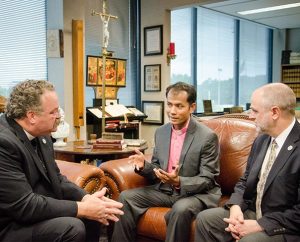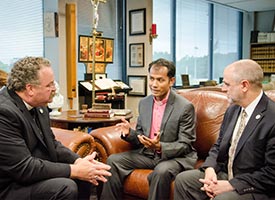By Paula Schlueter Ross
ST. LOUIS — The Rev. Vannarith Chhim, president of the five-year-old Evangelical Lutheran Church of Cambodia, believes Christianity can have a profound effect on the well-being of his largely Buddhist country.

“Keep praying for us,” he urges North American Lutherans. “You know the history of Cambodia from the killing fields — our last generation, what happened to our parents, our grandparents, 40 years ago,” from 1975 to 1979, during the reign of the Khmer Rouge who systematically murdered up to 2 million Cambodians, nearly a quarter of the country’s population at that time.
So, today, “we are a new generation,” said Vannarith, “looking from a Christian perspective, looking from Christ’s perspective, Jesus’ perspective, with the hope of the generation from the killing field. … Now Cambodia could be a living field, based on what Christ has done for us on the cross.
“The term we use is ‘from the killing field to the living field,’ ” Vannarith told Reporter during a Sept. 12 visit to the LCMS International Center in St. Louis. “I think it’s a great comfort, great answer to us, one [that] our generation will have to provide [through] counseling to our traumatized parents who have gone through the killing field [and ask] what are the answers for their lives?
“I think Christ is the answer to their lives,” he said. “Christ is the answer to the problems that the world faces [now] and that Cambodia faced 40 years ago, during the killing fields.”
Vannarith (who is known by his first name) was in the United States — his first visit here — to sign a protocol agreement with leaders of Lutheran Church—Canada (LCC) and The Lutheran Church—Missouri Synod that details how the three church bodies will work together in Cambodia over the next three years. He also met with LCMS President Rev. Dr. Matthew C. Harrison and the Rev. Dr. Albert B. Collver III, LCMS director of Church Relations, assistant to the president and director of Regional Operations for the Office of International Mission.
The Cambodian church president said he considers it a “great blessing” for his “small church, from a small country” to have a formal working relationship with confessional Lutheran super powers like the LCC and LCMS.
As a result of the agreement, Vannarith said his church body is “looking forward to theological training” from its two North American partners. It is, he adds, “our main need — for our church in Cambodia to have trained church leaders, pastors and deaconesses.”
The Evangelical Lutheran Church of Cambodia (ELCC) has some 3,000 members in 32 congregations, but only six ordained pastors — 14 others who are helping to lead ELCC congregations need additional training before they can be ordained, according to Vannarith.
The ELCC operates one elementary school — with 68 students — in Kampong Cham province, close to the Vietnam border. “We thank the Lord that last June we have baptized 56 children,” Vannarith said.
Offering that Christian education during weekdays — along with Bible studies on Saturdays and worship on Sundays — the ELCC is reaching out to children, their parents and entire communities “to produce,” with the power of the Holy Spirit, he said, “our next Lutheran generation” in a country where only 3 percent are Christian.
The new, three-way agreement signed last month updates two individual agreements between the Cambodian church body and the LCC and LCMS in 2010 and 2013, respectively, and “unites the three churches in a common bond of faith and confession, and in joint collaborative efforts” in specific areas, such as theological education, emergency relief/mercy ministries, Gospel proclamation/education/social ministry and short-term mission teams/volunteer work.
It recognizes the significance of the Cambodian church’s current efforts — with support from the Lutheran Heritage Foundation in Macomb, Mich. — to translate the Book of Concord into the country’s Khmer language.
The Rev. Dr. Leonard V. Harms, the LCC’s first executive director of Missions who now, in retirement, serves as an LCC missionary to Southeast Asia, said Cambodian church leaders “see that the Book of Concord” — the historic doctrinal standard of Lutheranism — “is what they need for their pastors to thoroughly be Lutheran and to confess the faith that we do. So they’re working hard for that.” Prior to joining the LCC’s staff in 1992, Harms had served from 1982 to 1991 with the LCMS mission board.
Darin Storkson, senior regional director for Asia with the LCMS Office of International Mission, said the Cambodians, like so many other young, Lutheran church bodies with Reformed theology backgrounds, “deeply desire to be confessionally Lutheran but are still learning what that means.”
In theory, “they are probably already in line with the LCMS doctrinally, and they are trying to learn how to express that in practice,” Storkson said. “I think we can expect to receive a formal request for fellowship from them in the near future.”
LCC President Rev. Dr. Robert Bugbee agrees, telling Reporter “I certainly hope so and I think so.” Bugbee said he is “impressed with the doctrinal soundness” of Vannarith and other leaders of the Evangelical Lutheran Church of Cambodia (ELCC) as well as their motivation in self-starting the ELCC in 2009.
He calls Vannarith “a very enterprising young man [who] immediately went to the Cambodian government and got the ELCC registered so it is able to function as a licensed religious group and permitted to do evangelistic and outreach work — which is really saying something in a country that’s dominated by Buddhism and other eastern faiths.”
At present, neither LCC nor the LCMS has missionaries in Cambodia, although the LCMS did have missionaries there from June 2006 until January of this year. A number of LCC seminary professors have completed short-term theological-education assignments in Cambodia since 2009.
Collver told Reporter that the Synod “is willing to place missionaries in Cambodia should a request come from the ELCC and the LCC.” When he and Harrison met with Vannarith, the Cambodian president “expressed a desire to have a theological educator in Cambodia.”
The new agreement “is very significant,” Collver added, “because it fits with the [LCMS] strategic plan’s goal of enhancing partnerships. In this case, the LCMS and LCC are strengthening their partnership by agreeing how the two church bodies will approach work in Cambodia. It also establishes a new partnership between the LCMS and the ELCC.”
Bugbee calls the new protocol agreement “an extremely positive thing” because it “is really an understanding among these three confessional Lutheran groups that they’re going to try to coordinate all of their efforts” in Cambodia.
“The primary emphasis,” he adds, “will be on developing the priorities identified by the indigenous church,” the ELCC, because “they know their country, they know their people, better than we ever will.”
Harms describes the ELCC as a “thriving” Lutheran church body and its president, Vannarith, as “young, smart, educated, knows his country and his people, and committed thoroughly to the scriptural doctrine that the Lutheran church confesses.”
Noting that “the Good News has the power of the Holy Spirit,” and the new protocol agreement brings together three Lutheran church bodies that are focused on sharing that Good News throughout Cambodia, Harms says, “there is the potential, in my mind, of [Lutheranism] probably being the dominant Christian religion in Cambodia in the next 10 years.”
Posted Sept. 25, 2014
